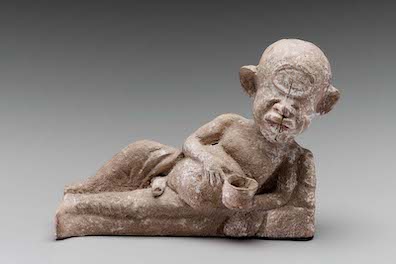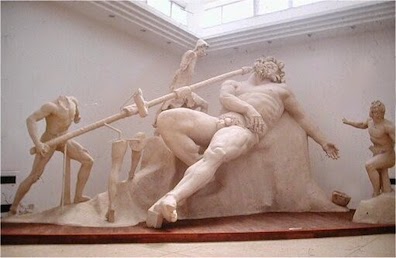Until Cyclops Joyce consistently employs third-person
narration shot through with interior monologue and
free indirect style––what he called the "initial style" of his
book. After the first six chapters, newspaper-like headlines
(in Aeolus), brief dramatic scripts (Scylla
and Charybdis), chopped-up space and time (Wandering
Rocks), and chopped-up words and phrases (Sirens)
work strange twists on the formula, but the underlying style
of narration remains intact. In The Odyssey of Style in
Ulysses, Karen Lawrence notes that the twelfth chapter
kills it off, ushering in a dizzying array of new techniques
for the remainder of the novel. But after the defamiliarizing
strangeness of Sirens, "the sudden appearance
of this [new] person is, for the most part, reassuring. No
matter how 'limited' a point of view he represents, the
presence of a definitive narrative self is comforting" (101).
The absence of any name or past attached to that self,
however, keeps the comfort level far from Dickensian. Ulysses
teems with unknown or barely known people: actual Dubliners
hiding behind pseudonyms, characters like "Martha
Clifford" who may be concealing their true identities,
mysteries like the man in the macintosh, dimly
recognized "whatdoyoucallhim" people, unnamed workers in
business establishments, anonymous people on the streets (the
"boy for the skins" and the "smaller girl" beside him, the
"blind stripling," the "whore of the lane," the "onelegged
sailor"). To have the narration of an entire chapter
commandeered by such a shadowy presence is disconcerting, and
Joyce does not follow the traditional strategy of encouraging
readers to identify with the speaker by giving him endearing
qualities. The narrator's chief personal characteristic is
snarling misanthropic contempt. His stream of palaver is
endlessly entertaining, however––hilarious, in fact, when read
by Stephen Rea.
In Circe Joyce briefly reincarnates the man's voice
via hallucination, when a jury of Bloom's peers convenes.
Eleven are acquaintances who have been with Bloom during the
day, but the twelfth spot is filled by "the featureless
face of a Nameless One." When this man speaks, it
becomes clear that he too has been around Bloom on June 16.
Picking up on a theme of cuckoldry introduced a few lines
earlier, he says, "Bareback riding. Weight for age. Gob, he
organised her." Alert readers may recall the Cyclops
narrator responding to Bloom's remark that Blazes Boylan
is "an excellent man to organise" Molly's concert tour:
"Excellent. / Hoho begob says I to myself says I.
That explains the milk in the cocoanut and absence of hair on
the animal's chest. Blazes doing the tootle on the flute.... That's
the bucko that'll organise her, take my tip." Another
"tip" in Cyclops concerns the Gold Cup
nod supposedly given to Bantam Lyons: "he told me Bloom
gave him the tip. Bet you what you like he has a hundred
shillings to five on." This detail too returns in Circe:
"(Snarls.) Arse over tip. Hundred shillings
to five."
The narrator's namelessness is of a piece with the fact that
the man who dominates all the conversation in Barney Kiernan's
is called only "the citizen" and never clearly identified. The
anonymity of these two, their aggressive contempt for others,
and their placement in a dark pub where men become dissolved
in alcoholic fumes strongly evoke the story in book 9 of
Homer's Odyssey, where giants called Cyclopes live
solitary, inhospitable lives in caves and where the chief
Cyclops sinks into an alcoholic stupor after drinking
Odysseus's wine. Anyone who has read this story will think of
the striking moment when Odysseus says that his name is
"Noman." But this is a trick that the hero uses to outwit the
giant into whose cave he has unwisely wandered. The Cyclops
himself has a name: Polyphemus. Joyce's Odysseus figure,
Leopold Bloom, does have a name, while the threatening
troglodytes in Barney Kiernan's do not. If intertextual
conversation is taking place, it seems unusually
garbled.
Similar allusive confusion arises from the fact that "The
Nameless One" is the title of a famous lyric by Joyce's
favorite 19th century Irish poet. Dubliner James Clarence
Mangan (1803-49) was a major poetic talent––Yeats considered
him a genius, and Joyce praised him extravagantly in an early
lecture––but he led a doomed life, drinking heavily, using
opium, suffering homelessness and sickness, and dying
wretchedly poor and emaciated. "The Nameless One" describes
this fusion of existential misery and imaginative exaltation:
...Tell how his boyhood was one drear night-hour,
How shone for him, through his griefs and gloom,
No star of all heaven sends to light our
Path to the tomb.
Roll on, my song, and to after ages
Tell how, disdaining all earth can give,
He would have taught men, from wisdom’s pages,
The way to live.
And tell how trampled, derided, hated,
And worn by weakness, disease, and wrong,
He fled for shelter to God, who mated
His soul with song....
Tell how this Nameless, condemned for years long
To herd with demons from hell beneath,
Saw things that made him, with groans and tears, long
For even death.
Go on to tell how, with genius wasted,
Betrayed in friendship, befooled in love,
With spirit shipwrecked, and young hopes blasted,
He still, still strove....
And tell how now, amid wreck and sorrow,
And want, and sickness, and houseless nights,
He bides in calmness the silent morrow,
That no ray lights....
Mangan became the Nameless One through substance abuse––a
possible link to the drinkers in Barney Kiernan's, and Barney
Kiernan himself drying out in a hospital––but
his highminded romanticism has nothing in common with the
narrator's reductive cynicism. It seems incredible that
Joyce's high opinion of Mangan could have changed so radically
from 1902 to 1919 that he chose to reincarnate him as a
venomous drunk in whom no embers of poetic, political, or
spiritual idealism glow. Nevertheless, he echoed Mangan's
verses five more times in Ulysses, all but one of them
in Cyclops where the poet's language adds to the
overblown hibernophilia of the parodic intrusions. Did he
intend some kind of ironic contrast with the Nameless
narrator? Some obscure affinity?
The Nameless One has not been subjected to anything like the
feverish hunts for hidden identity inspired by the anonymous
man in the macintosh and the possibly pseudonymous Martha
Clifford. But it is conceivable that detective work may
succeed in tying him to some character mentioned elsewhere in
the novel under a familiar name. At least one critic has made
such a claim. In "The Identity of the Cyclops
narrator in James Joyce's Ulysses," Journal of
Modern Literature 5 (1976): 534-39, E. I. Schoenberg
argues that the voice heard in the twelfth chapter belongs to
Stephen's father, Simon Dedalus. Schoenberg
makes some plausible observations but avoids some difficult
questions, one of which is this: if Simon is the narrator, how
can both of them serve on the jury in Circe?



